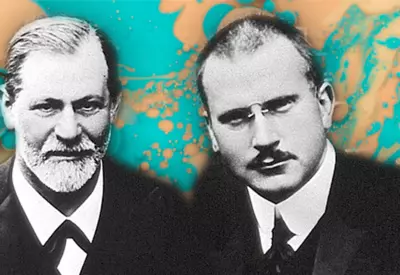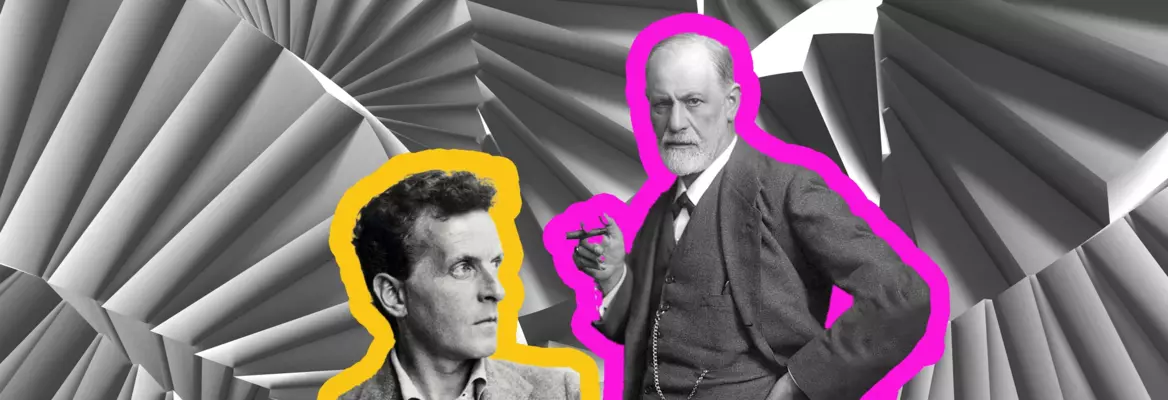Freud's understanding of the unconscious was largely mistaken, argued Wittgenstein. And yet, Wittgenstein described himself as 'a follower' and 'a disciple' of Freud; 'here at last', Wittgenstein said, 'is a psychologist who has something to say'. In this article, Edward Harcourt sets out to reconcile these positions. Harcourt argues that, although Wittgenstein was deeply sceptical of Freud’s philosophical understanding of his own theories – particularly Freud’s theory of the unconscious – Wittgenstein was still, in some sense, a follower of Freud.
On the face of it Wittgenstein and Freud don’t look like intellectual allies. Freud’s great project could be described as mapping our internal world, especially those bits of it that are hidden from consciousness. Wittgenstein on the other hand is sometimes thought to have denied we so much as have an internal world. In Philosophical Investigations, he asks
But could we also imagine a language in which a person could write down or give vocal expression to his inner experiences—his feelings, moods, and the rest—for his private use?
One of his most famous and difficult arguments – the so-called private language argument – is devoted to showing that the answer to this question is ‘no’.
___
Wittgenstein described himself as ‘a follower’ and ‘a disciple of Freud’; ‘here at last’, he said, ‘is a psychologist who has something to say’.
___
In fact, however, the picture is more complicated. Though Freud, as far as we know, was not aware of Wittgenstein, Wittgenstein – 33 years the younger - wrote quite a bit about Freud, and for a number of years one session in his regular course of lectures at Cambridge was entitled ‘Psychoanalysis’. But what he really thought about Freud is hard to pin down. On the one hand he described himself as ‘a follower’ and ‘a disciple of Freud’; ‘here at last’, he said, ‘is a psychologist who has something to say’. On the other hand he said Freud’s ‘whole way of thinking wants combatting’; Freud ‘offered fanciful pseudo-explanations’; Freud’s followers had made ‘an abominable mess’. What’s going on, and is there room for a rapprochement?
 SUGGESTED READING
When quantum physicists met Freud and Jung
By
One point of theoretical contact between them lies in the comparison Wittgenstein made, especially in the 1930s, between Freud’s psychoanalysis and his own philosophical method. But how deep does the comparison go? Philosophical puzzlement causes mental unease, thought Wittgenstein – so far so good, since that presumably also describes the condition of people who go for psychoanalysis. Still, surely Wittgenstein’s philosophical ‘therapy’ addresses intellectual confusions – the kind of misunderstandings that arise when our ‘intellects are bewitched by language’ - not emotional or personal ones. In reply, the Wittgenstein of the mid-30s might protest that philosophical confusion is deeply personal: as he says in his Big Typescript, to achieve philosophical clarity ‘resistances of the will have to be overcome’. But that still leaves a difference. What gets examined en route to undoing philosophical confusion are philosophical convictions, or inclinations to use a philosophically interesting word – ‘meaning’ or ‘sensation’ or ‘intend’, say – in this or that way; dreams, childhood memories, personal relationships, which are the stuff of psychoanalytic sessions, play no role in Wittgenstein’s method in philosophy. So the comparison between their methods doesn’t really go very far.
SUGGESTED READING
When quantum physicists met Freud and Jung
By
One point of theoretical contact between them lies in the comparison Wittgenstein made, especially in the 1930s, between Freud’s psychoanalysis and his own philosophical method. But how deep does the comparison go? Philosophical puzzlement causes mental unease, thought Wittgenstein – so far so good, since that presumably also describes the condition of people who go for psychoanalysis. Still, surely Wittgenstein’s philosophical ‘therapy’ addresses intellectual confusions – the kind of misunderstandings that arise when our ‘intellects are bewitched by language’ - not emotional or personal ones. In reply, the Wittgenstein of the mid-30s might protest that philosophical confusion is deeply personal: as he says in his Big Typescript, to achieve philosophical clarity ‘resistances of the will have to be overcome’. But that still leaves a difference. What gets examined en route to undoing philosophical confusion are philosophical convictions, or inclinations to use a philosophically interesting word – ‘meaning’ or ‘sensation’ or ‘intend’, say – in this or that way; dreams, childhood memories, personal relationships, which are the stuff of psychoanalytic sessions, play no role in Wittgenstein’s method in philosophy. So the comparison between their methods doesn’t really go very far.
___
He’s objecting not to Freud’s first-order claims – that actions can have unconscious explanations, or that dreams reveal unconscious thoughts or emotions – but rather to his philosophical packaging of them.
___





















Join the conversation